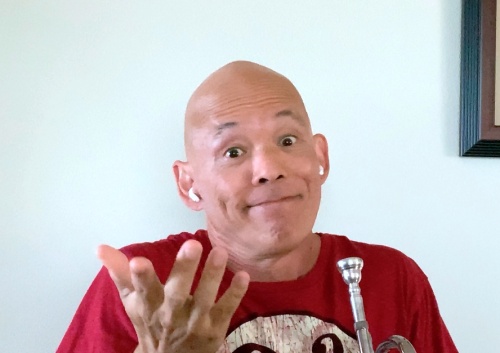Also known as “How to play trumpet at home – Episode 5”
How To Play Trumpet
Everyone is doing it and it sounds so easy. Learn a new language, like Latin. Learn to prepare gourmet meals with a can of beans and Spam. Rebuild your car’s engine. Learn to play an instrument. I took that as “learn how to play the trumpet”. Well, mostly because I used to play one of those “things” back in high school. It’s been taking up space in my closet. For years. Staring at me. Mocking me. “You used to play me, now you ignore me”. “I know you see me”. Okay, maybe this staying indoors thing is getting to me. Yep. I have one those “things” called a trumpet. Anyway, with being “Safer at home” time, I committed to relearn how to play this musical instrument called “thing”. This thing. That thing, That #$@! Thing. You know, the thing.
It’s like riding a bicycle.
Sure. If you rode a bike with your face while balancing on one hand. And juggling. Definitely juggling.
Trumpet?
In school, I learned the trumpet by playing music the band teacher gave us. Classical, Christmas, and marching band tunes. This was music I didn’t like, other than the second one. Please say you have no idea what that’s about. This time, I thought “why not learn to play the trumpet using jazz music?”. Sounds easy right? Simple, not easy. The trumpet has 3 valves with only 6 combinations. Simple. The hard part is that you have to use your face. Well, just a small portion of your lips that vibrate into the mouthpiece. The trumpet converts that into music. Or in my case, “animal in distress” noises. Please know that no animals real or imaginary were harmed. Although my neighbor’s dog may have a different perspective on this.
River Mouth aka Trumpet Embouchure

I “played” this thing from age 12 to 18. The public school music education was what it was. Like “here’s a mouthpiece, make some sounds”. How? “Use your face”. Sure, that makes sense. Really? This use of your face is called your embouchure. It’s a French word that means “river mouth”. Or in my case, “flopping on the ground fish” face. Maybe Google Translate didn’t get that right, not sure. I used to play with a lot of tension in my cheeks. Back then, no one said that wasn’t the best way. Now, every YouTube, Twitter post, and 5-year-old prodigy is saying how easy the trumpet is. If you do it right that is. I figured that I should start off the “right” way. Surely it would be easier. What everyone neglect in their iMovie outro’s is, everyone’s face is different. Oh and learning jazz? Since I never learned the Greek names for scales, I’m on page 10 of a 600-page book. So maybe the whole “riding a bike with your face” thing wasn’t accurate about playing the trumpet and jazz. It’s actually much harder.
Practice does not make perfect. Only perfect practice makes perfect.
That really famous person who said this, probably lots of times.
Funny thing. I was able to pick up that “thing” and play a few “sounds”. Play is probably an insult to real musicians. You see, my fingers remembered how to play a few exercises. If I tried to look at those funny black things sprinkled on paper. That’s where things went awry. Written trumpet notes being the things that I didn’t quite remember. Like trying to remember that a D sharp is the same thing as an E flat. But which note does that sound like? While I could practice, I wasn’t practicing the right way. I needed to read the music. I needed to hear what that little black thing sounds like. Trying to get that whole eyeball, brain, finger connection meant practicing the right way. YouTube to the rescue. Lots of amazing trumpet players to watch. For me, the younger players inspire me. I only played for 6 years so to see what these they can do in their teens is unreal. Try to play their intros. Listen. Squeak. Write. Squawk. Rewrite. That’s practicing that works. Trying to train my ear, brain, eyes, and fingers. Who knew “perfect practice makes perfect might work? Perfect? Well, let’s not get crazy. I figure I have the rest of my life to get as good as I’ll get. It’s like I found something that’d been missing.
A doctor is his own worse patient. Get up.
My mom every time I told her I was sick and should stay home.
With so much information available, I thought I’d just read it all. I can “DIY” this whole fix my trumpet embouchure thing I thought. So I searched “How to play trumpet”. With just a few hits (133,000,000) I started digesting everything. Well, just like the medical profession, lots of different options by people with letters after their names. The avalanche of research papers, YouTube videos, and 100 year trumpet teachers advice was overwhelming. Lesson learned. How about finding the common things people are saying? Found 2. Good air and good sound. Simple. Not easy. That whole “river mouth” face thing had it’s say. My “normal” overbite meant my bottom teeth are behind my upper. So I can do fancy things like, close my mouth. I really need to do more of that. But that’s a whole different Ted Talk. One of the key things I learned was by lining up my teeth (vertically) gave both my lips equal support. That meant I could use way less pressure on my upper lip. I’ve found I use far less pressure and have no tension in my cheeks. I feel like I’m heading in the right direction. That is if I was blindfolded and leading myself down a spiral staircase.
Patience is a virtue.
And a donut without a hole, is a Danish. Both are nice.

I started off being able to play one or two exercises. My fingers remembered. Ears, face, and brain, not so much. When I tried to read the notes and make it sound good, that was frustrating. I found a teacher and took a lesson. I told my teacher how I wanted to learn jazz. Oh and I was starting from scratch because my trumpet playing was ancient history. He asked me lots of questions. When it got to music theory, “0” stars on my part. He heard me play a few things and thought I wasn’t a total beginner. I kind of left out the whole aligning the teeth embouchure change. He gave me great instruction on how to get started with jazz, how to practice, and volume control. For the first few weeks I could only practice for 10-15 minutes. He taught me to rest the same amount of time that thing was on my face. That made a big difference. I could practice for an hour with 30 minutes of face time for a week. Thing is, that applies to all brass instrument players. Other instruments? What “they say” is “not to that extreme”. When I described the teeth alignment change, he said that will take a while. Like, a long while. This final lesson, the one that this “Safer at home” has helped me with is, patience. Not saying that I understand it. But it’s less of a mystery. Every now and again something halfway decent comes out and it gives me a little joy. For me, the changes are slow. This quarantine has given me one of the greatest gifts, the gift of time. Even when the world opens back up, I’m going to keep learning and playing. That “thing” is now my trumpet. And it stopped mocking me. Okay, it still does when I make it sound awful.


